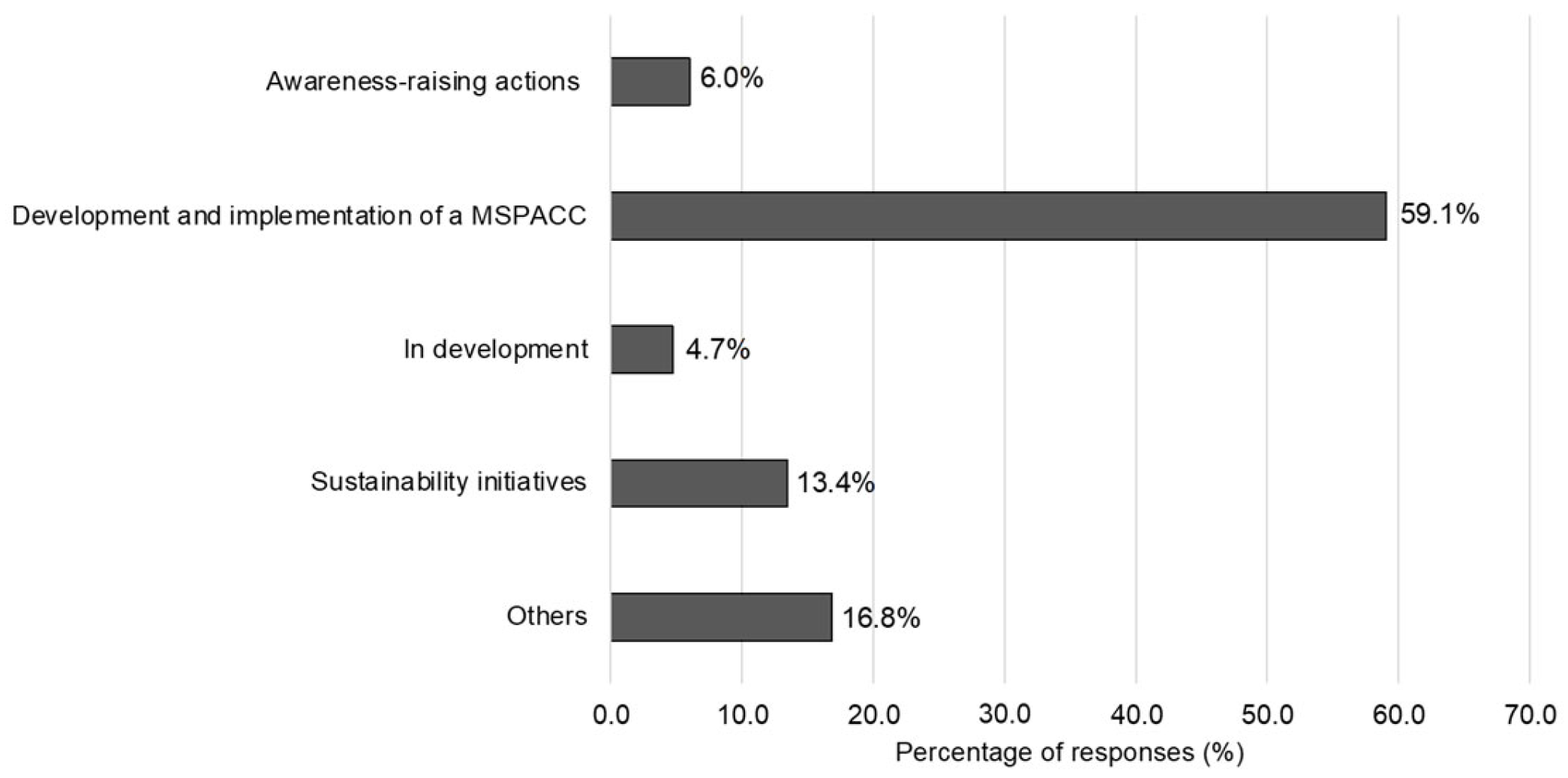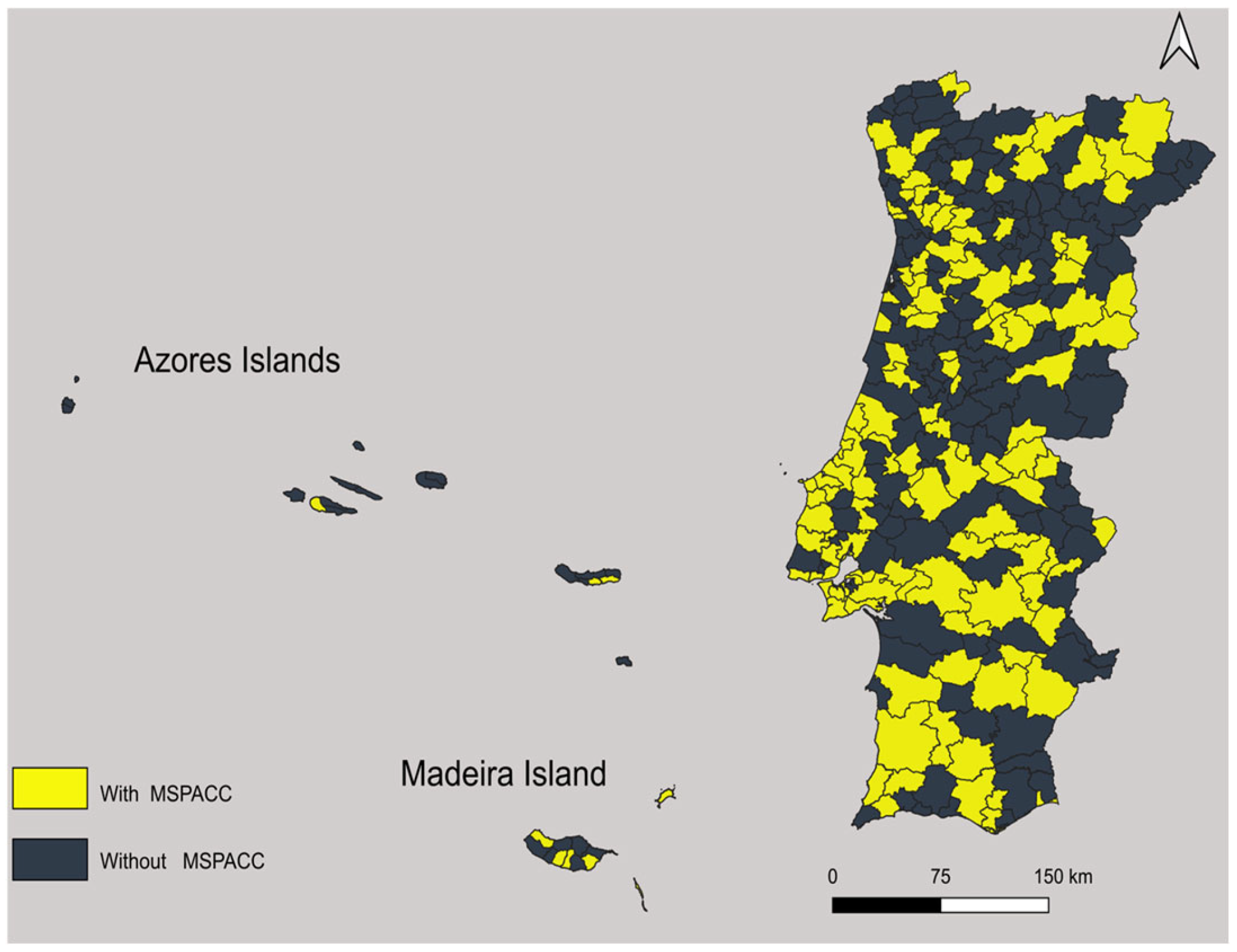1. Introduction
Rapid urbanization and climate change are intensifying the challenges faced by modern cities, particularly in relation to climate-related disasters [
1]. As a result, urban areas are becoming increasingly vulnerable, requiring urgent action and strategic planning to mitigate risks and enhance resilience.
In response, many municipalities have adopted Municipal Climate Change Adaptation Plans (MCCAP) or Municipal Climate Change Adaptation Strategies (MCCAS), collectively herein referred as Municipal Strategic Plans for the Adaptation to Climate Change (MSPACC). These frameworks aim to enhance resilience by guiding local governments in mitigating risks and adapting to evolving climate threats [
2]. However, municipalities contribute to climate adaptation in more extensive and multifaceted ways beyond MSPACC, including the integration of social development models and broader public policy approaches. While this article focuses on MSPACC and their relationship with Municipal Civil Protection Services (MCPS), further research should explore additional municipal contributions to climate adaptation, such as infrastructure development, urban planning, and public health initiatives.
The success of MSPACC relies on strong collaboration among various stakeholders, including the general population, public and private sectors, and MCPS. These services play a crucial role in ensuring public safety and enhancing resilience against climate threats. The “Resilient Cities in Portugal” campaign further supports these efforts by emphasizing risk prevention, proactive threat anticipation, effective disaster response, and rapid recovery [
3,
4]. Cities that embrace smart and adaptive strategies tend to be more resilient, capable of responding swiftly to crises while promoting the well-being of their inhabitants [
5,
6].
For MSPACC to be effective, well-structured policies must be complemented by active engagement from all sectors, ensuring that adaptation measures are practical, sustainable, and widely understood.
This study aimed to assess whether the adaptation plans and strategies implemented by municipalities serve as effective tools for preventing accidental events and disasters linked to climate change (CC). By evaluating their role in risk mitigation and emergency preparedness, this research contributes to understanding how municipalities can better integrate climate adaptation into local governance, ultimately strengthening community resilience and disaster prevention efforts.
2. Methodology
A survey was conducted using Google Forms®, consisting of 16 questions—13 closed-ended and 3 open-ended—divided into two main sections: (i) Sociodemographic data and (ii) information on climate change at the municipal level.
The survey was distributed between 24 October 2022, and 9 June 2023, via email and social media, to coordinators of the Portuguese MCPS. In some cases, follow-up phone calls were made to encourage participation.
A total of 279 responses were collected, representing 90.6% of all MCPS in Portugal. The data were analyzed using Microsoft Excel® version 28 for Windows and the Statistical Package for the Social Sciences® (SPSS) version 25 for Windows. Statistical analysis included descriptive statistics (absolute and relative frequencies) and inferential statistics, specifically the Chi-square test of independence.
Additionally, a geographical and territorial breakdown of the surveyed municipalities was conducted to identify regional trends in adaptation strategies.
3. Results and Discussion
The analysis of the collected data highlights key insights into the awareness and implementation of CC adaptation strategies among MCPS coordinators. When asked about the existence of any adaptation strategy in their municipality, 53.4% of coordinators reported being aware of such measures. Among those who acknowledged the presence of an adaptation strategy, 59.1% specifically referenced the development and implementation of an MSPACC, while 13.4% mentioned sustainability initiatives, and 6.0% cited awareness-raising actions (
Figure 1).
A critical issue in the interpretation of these responses is the lack of a clear definition of climate adaptation actions and strategies. Some respondents identified awareness campaigns as adaptation strategies, despite these being supplementary actions rather than comprehensive policy instruments. This confusion underscores the need for clearer guidelines on what constitutes climate adaptation.
Regarding climate risks, coordinators were asked whether their Municipal Civil Protection Emergency Plans (MCPEP) accounted for the increasing threats posed by CC. The results showed that 63.4% confirmed their plans included such considerations, while 35.2% stated they did not, and 1.4% were unaware. Additionally, when asked whether their MCPEP incorporated strategic actions to address climate-related threats, responses were nearly identical. However, it remains uncertain whether these responses reflect formal policy adoption, actual implementation, or subjective perceptions lacking scientific validation. This limitation underscores the need for further empirical research to evaluate the true integration of climate risks into MCPEPs. Despite these uncertainties, municipalities can enhance the alignment between adaptation plans (MSPACC) and emergency protocols (MCPEP), ensuring local governments are better equipped to mitigate risks and protect their communities from the escalating impacts of climate change.
When asked about the necessity of developing strategic actions to address CC, an overwhelming 97.8% of municipal coordinators responded affirmatively, with only 2.2% in opposition. This strong consensus highlights the growing recognition of CC as a critical challenge but also underscores the need for deeper knowledge and a more structured approach to implementation. However, opinions were divided regarding the effectiveness of existing strategic actions in reducing disaster risks—50.2% of municipalities reported positive outcomes, while 49.8% remained skeptical. These findings may obscure broader trends, as the survey reflects the perceptions of municipal civil protection coordinators, whose responsibilities are primarily tactical and operational rather than strategic. Consequently, their insights may not fully represent the municipality’s overarching climate adaptation strategy, which is shaped by political leadership. Future research should incorporate perspectives from municipal policymakers to provide a more comprehensive evaluation of climate adaptation efforts.
Regional analysis (
Figure 2) further reveals significant variations in climate adaptation strategies. Among the surveyed MCPS, 70% of coastal areas had an MSPACC in place, compared to just 45% in inland regions. Likewise, urban municipalities were more likely to integrate climate risks into MCPEP (68%) than rural ones (52%). These disparities highlight the influence of geography on adaptation approaches, with coastal and urban areas demonstrating a stronger commitment to proactive planning.
Overall, the findings suggest that climate adaptation strategies remain in their early stages and require further refinement, evaluation, and consolidation to enhance their long-term effectiveness. Strengthening collaboration between operational and strategic decision-makers will be essential in advancing more cohesive and impactful adaptation policies.
4. Conclusions
While interpreting the survey results as representative of municipalities’ official positions carries the risk of bias, it is evident that addressing the growing impacts of CC requires concerted efforts at both municipal and community levels to ensure the well-being of local populations. The principle of “Think globally, act locally” serves as a powerful framework to empower communities by fostering awareness, resilience, and proactive adaptation strategies. Strengthening collaboration between municipalities and educational institutions can enhance learning, innovation, and knowledge-sharing, contributing to safer and more dignified living conditions. Integrating safety culture training within MSPACC can further build resilience by aligning preventive actions with the potential of educational cities.
However, research indicates that there is still a significant gap in establishing a strong safety culture in climate adaptation. Adaptation plans need to be more practical, flexible, and dynamic to ensure their effective implementation and responsiveness to evolving challenges. Self-protection measures, identified as a central theme, play a crucial role in embedding safety culture within climate narratives, empowering communities, and supporting civil protection efforts.
Building a resilient society requires active and sustained engagement from all sectors, promoting a widely integrated safety culture that strengthens collective adaptation and response capacities. While MCPS coordinators in Portugal recognize extreme weather events as key threats and view the MCPEP as an essential operational tool, its alignment with the MSPACC remains limited. Addressing these gaps through improved knowledge, coordination, and practical implementation of climate adaptation strategies is vital to enhancing municipal resilience and preparedness.







